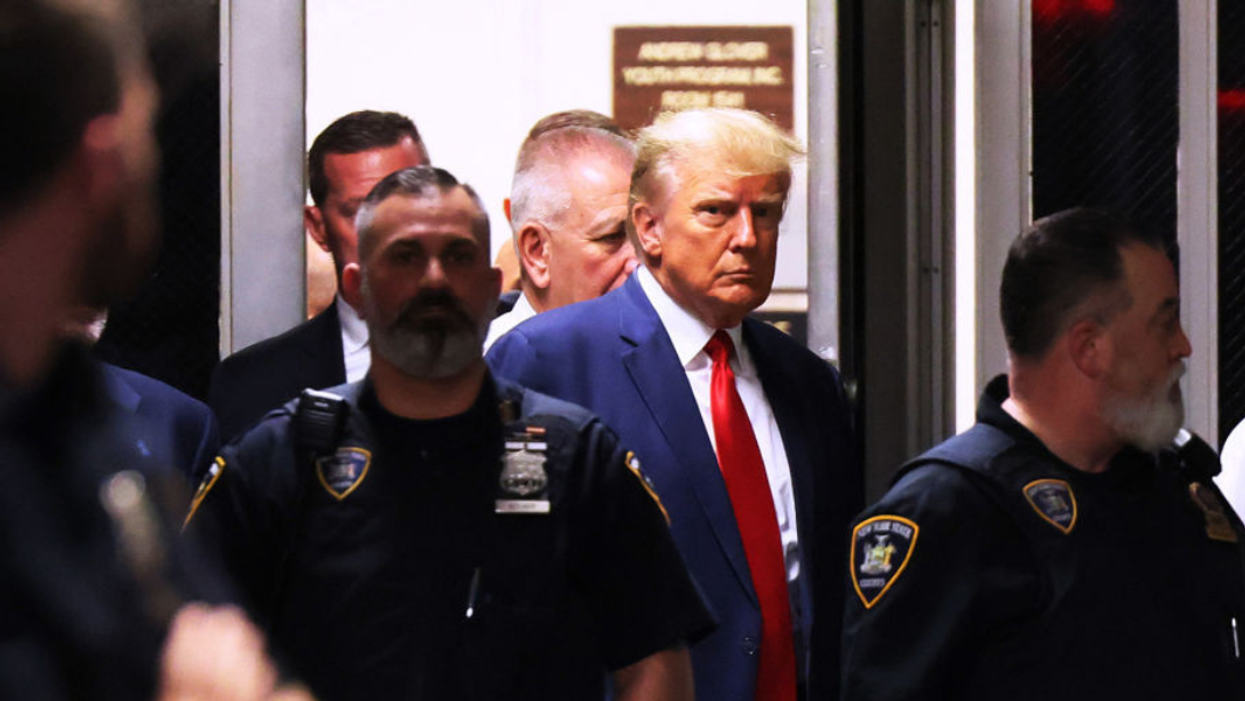Goldstone’s latest book is “Not White Enough: The Long, Shameful Road to Japanese American Internment.” Learn more at www.lawrencegoldstone.com.
If there really is no such thing as bad publicity, Donald Trump has had an excellent couple of weeks. Once dismissed by a growing number of Republicans as a candidate whose time had passed, who would be easily bested by a Trump-without-baggage like Ron DeSantis, the real Trump has been thrust back into the center ring by New York District Attorney Alvin Bragg, who Trump, totally in character, accused of being a racist.
The charges grow out of Trump’s alleged payment to two women to cover up adulterous affairs that, if made public, would have harmed his bid for office. While there has been a paucity of Republicans who have claimed that Trump is innocent, there is no shortage of accusations from the right that this entire action is politically motivated. (They must have had to put their denunciations of Hunter Biden aside to do so.)
Many Democrats as well have questioned Bragg’s strategy, wondering why, with far more serious charges pending in Georgia and with the Justice Department, Bragg did not simply wait until one of those was brought before seeking his indictment.
But Bragg had to go first, precisely because this was the most obscure of all the charges likely to be leveled against the former president. If he had waited, it would be akin to having the opening band at a rock concert play after the star attraction.
Some have argued that Bragg has contorted the statutes to bring felony charges against Trump when others who had committed the same crime would have been charged only with misdemeanors. Perhaps this is true, but as other white-collar criminals as well as some Mafia dons have learned, the authorities tend to be more aggressive with defendants seen as flouting the law, making it clear both in word and deed that they see the rules as applying only to lesser beings than themselves. It would be difficult to find a more apt example than Donald Trump.
In addition, although many skeptics have taken Bragg to task for shoehorning Trump’s behavior into an uncertain case, Bragg’s hand has been strengthened by an accused who cannot keep his mouth shut and likely sends his lawyers off nightly to swig Maalox.
And so, Republicans are not wrong when they focus on the political aspects of the New York case rather than the legal ones. For their party, Trump’s Bragg-induced elevation is a potential nightmare regardless of the outcome of the trial. Not only does it resurrect Trump as the undisputed favorite for the nomination; it makes certain that Trump realizes that he absolutely, positively must win. Being the Republican nominee—or even better a Republican president—is the only way he can effectively ward off the volleys of indictments likely coming his way, a process made easier now that Alvin Bragg has broken the ice.
Trump’s desperation will manifest itself in a number of ways. First and most obvious is that he will even more ferociously attack his rivals for the nomination, with no tactic too low or no comment too despicable. He will similarly go after Democrats, of course, but that will be for the same audience—Trump does not figure to get many crossover votes. In his immediate crosshairs will be DeSantis, who has already demonstrated a stunning lack of understanding that running a national campaign is not the same as pandering to his Florida choir.
Other declared and potential candidates will come in for similar treatment as soon as they are perceived as credible threats. Thus, Republicans who intended to run as reasonable, policy-oriented conservatives, capable of attracting disaffected Democrats—Glenn Youngkin and Chris Sununu, for example—will be forced to fight in the gutter or, like Jeb Bush, be dismissed as weak. Former associates such as Mike Pence and Mike Pompeo will be castigated as ingrates and traitors.
None of this will help Republicans regain the White House in 2024. While he may be again the darling of the Republican right, polls have shown that Trump is the least likely in his party to win in 2024. Needless to say, anyone who harbors a scintilla of hope that he will step aside for the good of his party, or even endorse anyone who beats him for the nomination, can put in his or her application now for a scholarship to Trump University.
But the impact of Trump’s coming kamikaze strategy goes even further. In order to make certain that everyone knows he is back on top, in addition to his own campaign, he will energetically promote his choices for key congressional races. If he succeeds in gaining nominations for a new round of Herschel Walkers and Dr. Ozes, he may also succeed in allowing Democrats to maintain control of the Senate, which under normal circumstances, they were extremely unlikely to do.
If Republican leaders needed any reinforcement of that notion, they need look no further than Wisconsin, where Daniel Kelly, a Trump acolyte, was demolished in his race for state supreme court. Kelly was dismissed as a “weak candidate,” as indeed he was, but that is the Republicans’ problem in tight races in the age of Trump. They are all weak candidates because strong candidates cannot get nominated.
It seems unlikely that the savvier leaders of the party are unaware of this potential doomsday scenario. The question is, what can they do about it? Attacking Trump head on is out of the question. Even if they succeeded in denying him the nomination and even defeating his chosen congressional candidates in the primaries, Trump, for whom loyalty is a foreign phrase, will likely instruct his followers to stay home in the general election, thus allowing him to say, “They should have listened to me.”
But nor can they simply allow him to waltz into the nomination, dragging a bunch election-denying conspiracy theorists along with him.
In the end, Alvin Bragg’s motives are unimportant. He has, at least for the foreseeable future, succeeded in pulling off a difficult political carom, bouncing his shot off Trump to potentially sink the Republican Party in the side pocket.




















